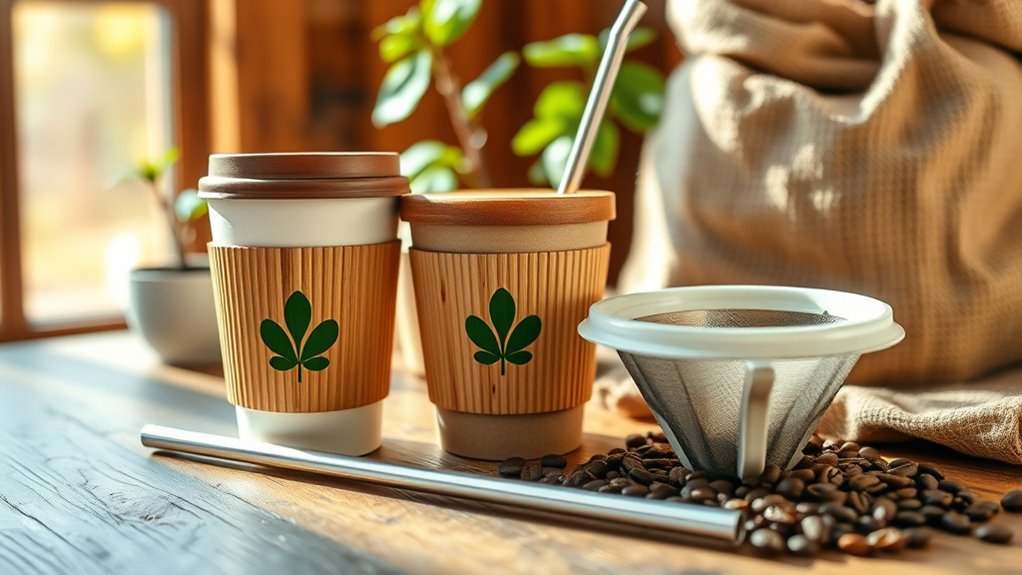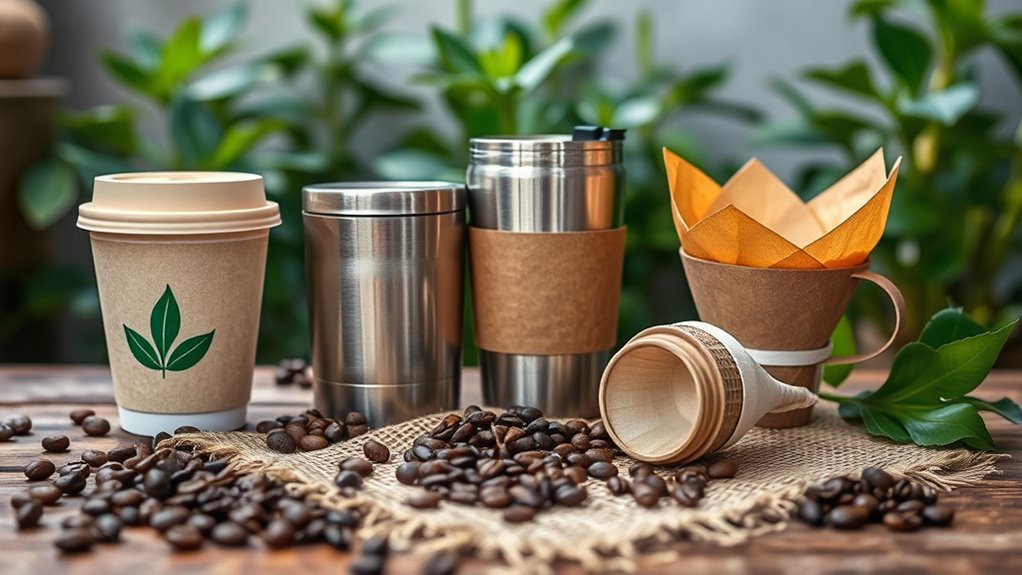Choosing eco-friendly coffee products helps you enjoy your favorite brew while minimizing environmental harm. Opt for compostable cups and sleeves, reusable filters, and refillable containers to cut waste. Support brands with certifications like Fair Trade or Rainforest Alliance that prioritize sustainable farming and ethical practices. Using biodegradable packaging and bulk options further reduces your carbon footprint. By making these simple swaps, you can make a positive impact—discover more ways to enjoy coffee responsibly as you continue exploring.
Key Takeaways
- Choose compostable cups, sleeves, and biodegradable pods to reduce landfill waste and support natural decomposition.
- Opt for reusable coffee filters, tumblers, and containers to minimize single-use product consumption.
- Support brands with certifications like Fair Trade, Rainforest Alliance, and organic labels for ethical sourcing.
- Select coffee products packaged in plant-based or compostable materials to lessen environmental impact.
- Participate in carbon offset programs and adopt sustainable farming practices like shade-grown coffee to reduce ecological footprints.

Many coffee enthusiasts are choosing eco-friendly products to reduce their environmental impact. If you’re looking to make more sustainable choices, there are plenty of options that help you enjoy your favorite brew while protecting the planet.
Switching to compostable coffee cups, for instance, is a simple yet effective way to cut down on single-use plastic waste. These cups are made from plant-based materials that break down naturally, easing the burden on landfills and reducing pollution. Pairing them with paper coffee cup sleeves instead of plastic ones further decreases plastic waste, making your coffee routine more environmentally responsible.
Using reusable coffee filters also makes a significant difference. Unlike disposable paper filters, these can be used multiple times, reducing the amount of waste generated with each brew. Refillable coffee containers are another smart choice; they allow you to store your coffee beans securely while minimizing packaging waste.
When you opt for biodegradable coffee pods, you eliminate the plastic waste associated with traditional single-use pods, supporting a more sustainable single-serve coffee experience. These eco-friendly pods are designed to break down faster, lessening their environmental footprint.
Your choice of packaging plays a vital role in sustainability too. Plant-based coffee bags and compostable packaging materials replace traditional plastic and foil options, making your coffee shopping much greener. These innovative packages are designed to decompose naturally, helping reduce landfill accumulation.
Supporting sustainable certifications such as Fair Trade, Rainforest Alliance, and organic certifications ensures you’re backing environmentally and socially responsible practices. These certifications also emphasize leadership skills within the industry, encouraging brands to uphold high standards.
By choosing shade-grown or agroforestry coffee, you support farming methods that preserve ecosystems and enhance biodiversity. These practices often include reforestation efforts and natural pest control, which help protect wildlife and improve water quality.
Supporting brands that participate in carbon offset programs can further reduce your overall carbon footprint, as they invest in reforestation projects and renewable energy initiatives.
In your daily routine, avoiding single-serve pods and opting for bulk coffee beans or biodegradable options makes a noticeable difference. Using reusable tools like coffee filters and tumblers not only cuts waste but also encourages more mindful consumption.
Supporting brands that prioritize sustainable packaging and participate in carbon offset initiatives ensures you’re making conscious choices that benefit the environment. Every small step, from the materials you choose to the farming practices you support, contributes to a healthier planet and a more sustainable coffee future.
Frequently Asked Questions
How Do Biodegradable Coffee Filters Differ From Traditional Ones?
Biodegradable coffee filters differ from traditional ones because they’re made from natural, eco-friendly materials like unbleached paper, bamboo, or plant fibers.
Whereas traditional filters are usually bleached or treated paper. You’ll find biodegradable filters decompose faster and help reduce landfill waste, supporting sustainable practices.
They often perform similarly, but some may influence flavor or oil filtration.
Reusable options like cloth filters provide a long-term, eco-conscious alternative.
Are There Eco-Friendly Alternatives to Single-Use Coffee Cups?
Like the phoenix rising from ashes, eco-friendly alternatives to single-use coffee cups are transforming your coffee experience. You can choose reusable options like stainless steel, bamboo fiber, or silicone collapsible cups, which cut waste and promote sustainability.
Plus, compostable cups made from bagasse or PLA linings break down naturally. Switching to these eco-friendly choices not only benefits the environment but also aligns your habits with a greener, more responsible future.
Can Compostable Coffee Packaging Fully Decompose in Home Composts?
You wonder if compostable coffee packaging can fully break down in your home compost. The answer is yes, if it’s made from certified materials like Kraft or rice paper that meet standards such as AS 5810-2010.
You need to remove non-compostable parts, like labels and degassing valves, and guarantee it disintegrates within six months.
Properly managed, your compostable packaging will turn into organic fertilizer, benefiting your garden.
What Certifications Indicate a Coffee Product Is Truly Sustainable?
You want to know which certifications show a coffee product is truly sustainable. Look for labels like Rainforest Alliance, which combines environmental, social, and economic standards.
Fair Trade ensures fair prices and practices, while Organic certifies chemical-free farming. UTZ emphasizes resource efficiency.
These certifications demonstrate that the coffee meets strict sustainability criteria, so you can enjoy your brew knowing it supports environmental health, fair livelihoods, and long-term viability.
How Can I Reduce Water Usage When Brewing Eco-Friendly Coffee?
Imagine your coffee ritual as a gentle river, flowing with purpose. To reduce water use, choose cold brew—it’s like taking a calm, mindful walk instead of a hurried run, using less energy and water.
Use smart, water-efficient brewing equipment as your guiding compass, and keep drip trays and sensors in place to catch leaks.
Every mindful sip conserves water, turning your coffee into a sustainable act that nurtures the planet.
Conclusion
By choosing eco-friendly coffee products, you’re not just making a small change—you’re transforming the entire planet’s future. Every sustainable cup you enjoy has the power to save countless forests, reduce pollution, and fight climate change. Your everyday choices are more powerful than you think, capable of creating waves that could dwarf even the tallest mountains. So, sip consciously and be a hero for the environment—your actions truly make a difference.









